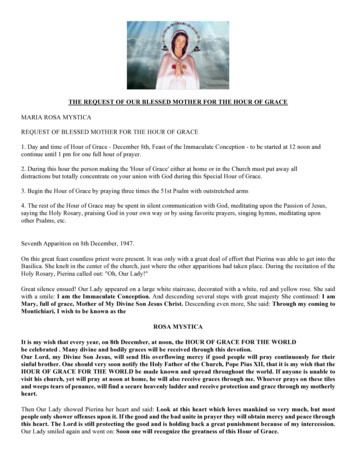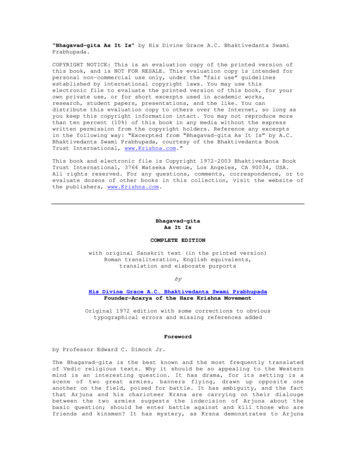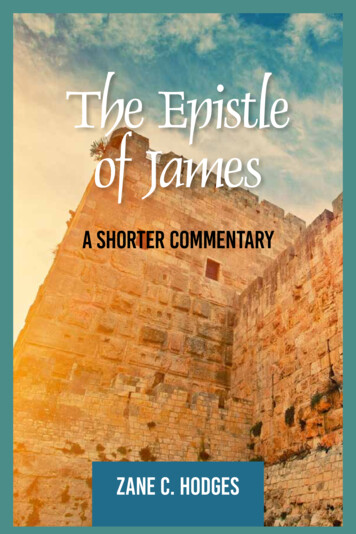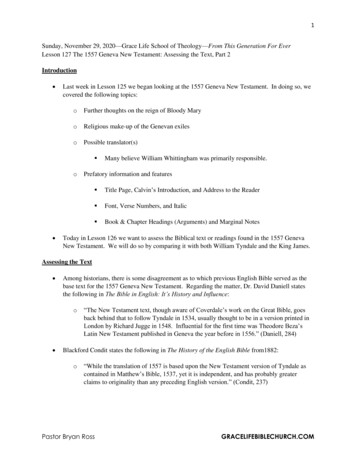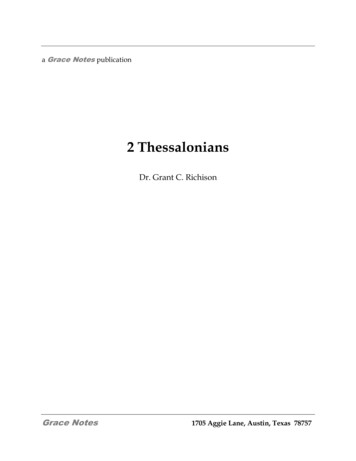
Transcription
a Grace Notes publication2 ThessaloniansDr. Grant C. RichisonGrace Notes1705 Aggie Lane, Austin, Texas 78757
2 ThessaloniansTable of ContentsForeword . 3Introduction . 52 Thessalonians 1:1 . 62 Thessalonians 2:1 . 192 Thessalonians 3:1 . 46
ForewordThese lessons in 2 Thessalonians are compiled from the writings of Dr. Grant C.Richison, which were published on the Internet beginning in 1997 in the CampusCrusades (Canada) daily online devotional Today’s Word.Dr. Richison is a highly experienced pastor, lecturer, and Christian servant who isdedicated to a lifetime of studying and teaching God's Word. Almost immediately afterhis salvation he began to desire to teach the Word, and he set about a lifelong programof preparation and ministry.Dr. Richison has a diploma from Detroit Bible Institute, a bachelor's degree in religiouseducation from William Tyndale College (Detroit), a Masters in Theology from DallasTheological Seminary, and a doctorate in ministries from Luther Rice Seminary inJacksonville, Florida.Dr. Richison has been pastor and senior pastor of Baptist churches from 1965 to 1992.His most recent pastorate was at Grant Memorial Baptist Church, Winnipeg, Manitoba,where, over a 20 year period, he had oversight of a ministry that expanded from about350 to more than 2500 communicants. During the period of his pastorates, Dr. Richisonwas also a lecturer at Detroit Bible College and Winnipeg Theological Seminary.From 1993 to 1995, Dr. Richison was Director of Leadership Ministries for CampusCrusade for Christ (Canada). He currently has a world-wide lecture ministry withCampus Crusade.Dr. Richison is an experienced writer, and he provides materials for three areas on theInternet: Sermon on the Net; Today's Word, and Pastors' Power Points. He hasconsiderable ability to communicate God's Word verse by verse in a relevant, clear,applicable and insightful manner and to communicate vision and establish a philosophyof ministry in the local assembly. .Dr. Richison has served on the following boards and conferences: Lower Michigan Baptist General Conference (district of Baptist General Conference,board member) Great Lakes Baptist Conference (district of Baptist General Conference, chairman) Central Canada Baptist Conference (district of Baptist General Conference,chairman) Child Evangelism Fellowship (Manitoba) Evangelical Fellowship of Canada International Ministries to Israel (Canada) Chairman of Greater Manitoba Sunday School Convention Chairman of Marney Patterson Evangelistic Crusade (city-wide in Winnipeg)
Chairman of Terry Winter Evangelistic Crusade (city-wide in Winnipeg) Chairman of the "Why Campaign" (city-wide evangelistic trust in Winnipeg) Chairman of the Board of Regents of Canadian Baptist Seminary (part of consortiumof seminaries on Trinity Western University) Baptist General Conference of Canada (board member) Briarcrest Bible College and Seminary, Moose Jaw, Sask. Electronic Bible Society, Dallas Texas President's Cabinet, Campus Crusade for Christ, CanadaGrace NotesGrace Notes is a Bible study ministry which began in 1994 using the Internet todistribute lessons and articles to people who are interested in God's Word. Thousandsof Christians, in more than 110 countries around the world, receive weekly Grace Noteslessons on the Internet, by E-mail and the World Wide Web. All courses and materialsare distributed free of charge, and the work is supported by believers who want to seethe ministry continue and grow. Grace Notes studies are also distributed on disketteand CD-ROM in order to reach those who do not have Internet access.Verse-by-verse courses are available in more than 30 books of the Bible. Some of thecourses include word studies (categorical doctrine) or historical articles (isagogics) thatare relevant to the passages being discussed. Other courses offered are Bible characterstudies, comprehensive studies of the Christian Life and Basics of the Christian Life, anextensive series on the Person and Word of Jesus Christ, and a thorough study of theAttributes of God. You are invited to write to the address below, or write by e-mail, toinquire about Grace Notes materials.Warren Doud, Director1705 Aggie LaneAustin, Texas 78757E-Mail: wdoud@bga.com
52 ThessaloniansIntroductionWRITER-- Paul (1:1; 3:17)PLACE OF WRITING-- Corinth (Acts 18:5)DATE-- A.D. 52OCCASION-- Paul heard that the Thessalonians were teachingthe false idea that the Day of the Lord had come.Some quit their jobs because of this.PURPOSESto correct the false error that the Day of the Lordhad cometo give proper criteria to recognize that day.F. Tone more formal and rigid than 1Thessalonians.G. Turn of events: dynamic outreach church in 1Thessalonians has become a church turnedinward.HISTORICAL BACKGROUND TO MINISTRYAT THESSALONICAA. Paul received the Macedonian vision at Troy togo to Europe, Acts 16:8-14.This was the beginning of spreading the gospelfrom the continent of Asia to the continent ofEurope. Going to Thessalonica transferred theministry of the gospel to Western civilization.Macedonia was the former kingdom of Alexanderthe Great (he wanted one-world domination andenlightenment with the culture of Greece. Hewanted to marry east and west.)B. Paul came to minister in Thessalonica for threesuccessive and successful weeks.THEMEThe Jews accused Paul's evangelistic team of"turning the world upside down."-- corrections about the Day of the Lord (2:2)Paul fled the city in the face of much opposition.KEY VERSESC. The principal people in the church atThessalonica were Gentiles (1:9; Acts 17:4).-- 1:7-10; 2:3PECULIARITIESOUTLINE FOR SECOND THESSALONIANSA. Apocalyptic, 2:1-12A. Greeting (1:1-2)B. Emphasis on the Day of the LordB. Commendation (1:3-12)C. Adds to the prophetic truths of 1 Thessalonians1.Appreciation (1:3-4)D. Contrasts to 1 Thessalonians2.Perseverance (1:5-10)1 Thessalonians deals with Christ's coming for thesaints in the air while 2 Thessalonians deals withChrist's coming to the earth with the saints.3.Prayer (1:11-12)1 Thessalonians presents the coming of Christwhile 2 Thessalonians sets the stage for the comingof the Antichrist.1 Thessalonians emphasizes the Day of Christ[Rapture] while 2 Thessalonians emphasizes theDay of the Lord [tribulation].1 Thessalonians concerns itself with the deadwhile 2 Thessalonians concerns itself with theliving.E. The shortest epistle that Paul ever wrote to anychurch: 3 chapters, 47 verses and 1,042 words.C. Correction (2:1-12)1.Day of the Lord (2:1-5)2.Mystery of lawlessness (2:6-12)D. Continuing (2:13-17)1.Thanksgiving (2:13-15)2.Prayer (2:16-17)E. Commandments (3:1-15)1.To pray (3:1-2)2.To put confidence in apostles (3:3-5)3.To correct disorderly (3:6-10)4.To command the idle (3:11-13)
62 Thessalonians5.To discipline the disorderly (3:14-15)F. Conclusion (3:16-18)2 Thessalonians 1:1"Paul, Silvanus, and Timothy, To the churchof the Thessalonians in God our Father andthe Lord Jesus Christ:"We come now to Paul's shortest epistle.The first two verses make up the salutation. Thisgreeting is essentially the same as in 1Thessalonians.Paul, Silvanus, and Timothy,These are the same three names found in 1Thessalonians 1:1. This was an effective andpowerful team as we saw in our study of 1Thessalonians. Paul, a leader, scholar and writerdetermined to spread the gospel throughout theRoman world.Silvanus, a Hellenistic Jew, held a prominent partof the Council at Jerusalem. The Council askedhim to accompany Paul and Barnabas to Antiochto strengthen the church there. He also joined Paulon his second missionary expedition. He facilitatedboth Paul and Peter in the writing and delivery oftheir epistles.Timothy was a vest pocket edition of the apostlePaul and Paul's son in the faith. His father was aGentile and his mother a Jew. Timothy was apastor and a troubleshooter for Paul.To the church of the ThessaloniansChurches in the New Testament often named theirchurches based on the city or province where theywere located (1 Corinthians 16:1; 2 Corinthians 8:1;Galatians 1:22). Paul maintained care for theThessalonians. He did not "love 'em and leave'em". People that we influence for the Lord requireour maintenance. Everyone goes throughdevelopment aches and pains. Perfection isprogressive, not instant.in God our Father and the Lord Jesus Christ:The church at Thessalonica was in "God our Fatherand the Lord Jesus Christ." The church had itsorigin in a source, the Father and the Lord JesusChrist. The reason that church existed was due tothe ministry of the Father and Son. The Father hada mission for the Son. The Son fulfilled thatmission. The church at Thessalonica was a result.God has a plan for every church.PrincipleOur church is not ours but God's.ApplicationYour church belongs to God the Father and theLord Jesus Christ. Because of this, we are underdivine surveillance. We must remember that ourchurch is not ours. When tempted to cause aproblem in our church, we need to keep in mindthat God keeps surveillance on it. We must keepthat in mind when we want to give someone apiece of our mind. Our church is the church ofGod the Father and the Lord Jesus Christ, not ours.2 Thessalonians 1:2"Grace to you and peace from God our Fatherand the Lord Jesus Christ"Now we come to Paul's standard "Hello" in hisepistles: "grace and peace."Grace to youGrace is God's provision for the believer withoutany strings attached. God's provision comes fromtwo persons of the Trinity, the Father and Son.and peacePeace also comes from those same two persons ofthe Trinity. A person with peace is a person with asettled soul. This settled soul comes from God'sgrace. Grace always precedes peace.fromThe word "from" indicates the source of "grace"and "peace."God our Father and the Lord Jesus ChristPaul repeats the words "God our Father and theLord Jesus Christ." This says something about ourstrength as believers; grace and peace come from aco-fountain. We have a dynamic duo as asupernatural resource for strength.Note the emphasis on the lordship of Christ in Hisrole as the source for our strength.PrincipleGod sustains believers with no strings attached.
72 ThessaloniansApplicationAlthough we may feel that we do not deserveGod's sustaining grace, God gives it anyway.Although we do not feel deserving of peace, Godgives it to us because of His grace, that is, Hisprovision for those He loves. We cannot pay forour sins as believers because Christ did all thesuffering that was necessary for those sins. We reston His grace. God does not need our help.A believer cannot function efficiently withoutGod's grace and peace. Many of us operate onpersonal drive, not on grace. That is a good way tohead into spiritual shipwreck. We cannot operatewithout God's grace anymore than a plane can flywithout fuel. God's grace is our spiritual fuel forflying in the Christian life.A Christian who rests on God's grace has a settledsoul and can sit down on the inside. He knowsthat God provides for any situation. He has a clearmind in any problem. Is something consumingyou? If you keep your mind on the Lord, He willgive you composure in the middle of yourcommotion."You will keep him in perfect peace, Whosemind is stayed on You, Because he trusts inYou" (Isaiah 26:3).2 Thessalonians 1:3"We are bound to thank God always for you,brethren, as it is fitting, because your faithgrows exceedingly, and the love of every oneof you all abounds toward each other "Now we turn to the commendation section of 2ndThessalonians (1:3-12). If Paul could find a reasonto thank God for a local church, he always did. Heeven brought himself to thank God for the carnalCorinthian church. He could not bring himself tothank God for the Galatians, however, becausethey defected from the principle of the finishedwork of Christ.We are bound to thank GodThe word "bound" means to owe. This is a word ofdebt or obligation. Paul owes God a debt of thanksfor the Thessalonians. He views thanks as a dutybecause he prayed that the Thessalonians might"increase and abound in love." God heard hisprayers so he owes God his thanks. This is thesubjective side of thanksgiving to God. Paul's teamsensed a principled obligation to give thanks.alwaysPaul and his team carried a constant sense ofthanksgiving to God for the Thessalonians. Hefound many occasions whereby he could thankGod for them.for you, brethren,Paul was grateful, not just in some general fashion,but for two very specific things about theThessalonians: 1) their increasing faith towardGod and 2) their expanding love for fellowChristians. In the next verse, he boasts to otherchurches about other dynamics in theThessalonian church.PrincipleChurches have reputations just like individualChristians.ApplicationEvery church has a name just as every Christianhas a name. Each church has a testimony. Somechurches have little reputation in the nonChristian community. Some have little reputationwith the Christian community. What kind oftestimony does your church have?Thanksgiving relates to our capacity of soul. Thegreater our appreciation for what God is doing inthose to whom we minister, the more it is fitting orappropriate to give God thanks. We cannot gainGod's approval so that He will do somethingthrough us. We acknowledge that what He does,He does through His grace. A thankful heart justresponds to God's grace. God is not impressedwith who we are or what we do. He is impressedwith who Jesus is and what He did. A sense ofwhat God does through His grace is always thebasis for our thanks.as it is fitting,The word "fitting" carries the ideas of weight,value, worth, befitting, becoming, right on theground of fitness. Thanking God for fellowbelievers weighs something. It has some worth,therefore, it is "fitting" or right that one givesthanks. This is proper in correspondence to whatGod expects. This is the objective side of
82 Thessaloniansthanksgiving to God because it responds to God'sconcrete answer to prayer. This is thanksgivingbased on facts, not potential. The gospel teamnever took for granted God's work in the lives ofthe people to whom they ministered. They did notattribute change in the lives of the Thessaloniansto themselves.PrincipleGiving God thanks for fellow Christians amountsto something.ApplicationAre you "bound" to thank God for what God isdoing through you? Are you compelled to launchfrom your soul appreciation to God for what He isdoing?"For this reason we also thank God withoutceasing, because when you received theword of God which you heard from us, youwelcomed it not as the word of men, but as itis in truth, the word of God, which alsoeffectively works in you who believe" (1Thessalonians 2:13).Some Christians respond to the exposition of theWord. They live out the principles of God's Word.They apply it to their lives. They share their faithwith believers and unbelievers alike. We cannothelp but give God thanks for these churches. Somepeople respond to God and others do not.becausePaul now gives the grounds for the gospel team'sthanksgiving. He uses two words for the growth ofthe Thessalonians "grows exceedingly" and"abounds." The essential reason behind Paul'sthanks is growth.your faith grows exceedingly,The words "grows exceedingly" comes from twowords: to increase or grow and beyond measure.This is the only time this word occurs in the NewTestament. Our faith can grow internally, as theorganic growth of a tree. It also can growexceedingly. Not only had their faith grown but itflourished. Our faith should never level off atsome plateau and become stationary. Our faith isnever static; it either grows or shrinks in size. Itnever remains the same." but grow in the grace and knowledge ofour Lord and Savior Jesus Christ. To Him bethe glory both now and forever. Amen" (2Peter 3:18)."But you, beloved, building yourselves up onyour most holy faith, praying in the HolySpirit " (Jude 20).PrincipleThe faith of some Christians grows much fasterthan the faith of others.ApplicationThere are two aspects to our faith: 1) saving faith2) dynamic or forceful faith. Each Christian is hassaving faith but not every Christian radiatesforceful faith.The amount of faith differs with each believer.Every Christian has the same quality of savingfaith but not the same quantity of dynamic faith.The faith of some Christians is the same as whenthey became Christians. They have not grown intheir faith at all. There is little development andmodest progress in their faith."And the apostles said to the Lord, 'Increaseour faith'" (Luke 17:5 ).The more we understand the principles of God'sWord and apply them to our experience, thegreater our faith grows. We should increase ourspiritual capacity like we increase our mentalcapacity. Faith is like a muscle, the more weexercise it the more it develops. If we neglect ourfaith, it will atrophy and get weaker.There is such a thing as "great faith." We can havelittle faith (Matthew 6:28-30), medium faith orgreat faith."When Jesus heard these things, Hemarveled at him, and turned around and saidto the crowd that followed Him, 'I say to you,I have not found such great faith, not even inIsrael!'" (Luke 7:9).There is a great difference between those whobelieve that God can change their lives and thosewho do not. Do you believe that God will work tochange the members of your family? Do youbelieve that God will use you to win many forChrist? We need more people like Abraham whowas "strong in faith."
92 Thessalonians"He did not waver at the promise of Godthrough unbelief, but was strengthened infaith, giving glory to God, and being fullyconvinced that what He had promised Hewas also able to perform" (Romans 4:20-21).and the love of every one of you allThe Thessalonians' faith in God grew and theirlove for each other expanded as well. These are thetwo levels of their growth.Note the word "every" and the word "all." Therewere no exceptions in the Thessalonian churchwhen it came to abounding love toward oneanother. They all loved each other.abounds toward each otherThe word "abounds" is simply more [in quantity].Sometimes this word has the idea of"superabundantly." When it comes to loving oneanother, we should have it in superabundance. Weshould not put bounds around it. We break thebounds when it comes to love. Not only did theThessalonians faith grow but also their love grewin quantity.It is one thing to develop our faith and it's anotherthing to develop our love to others. Some peoplehave strong faith but weak love. Others havestrong love but weak faith. God expects us toreach a point of strong faith and strong love.2 Thessalonians 1:4" so that we ourselves boast of you amongthe churches of God for your patience andfaith in all your persecutions andtribulations that you endure "so thatBecause of the Thessalonians’ two aboundingearmarks of faith and love (1:3), Paul boasts ofthem to other churches."And let us consider one another in order tostir up love and good works, not forsakingthe assembling of ourselves together, as isthe manner of some, but exhorting oneanother, and so much the more as you see theDay approaching" (Hebrews 10:24-25).PrincipleWhen we increase the extent of our love to thepoint of abundance, it will create a momentum oflove among the community of believers.It is legitimate to use other churches as our modelfor building a local chu
Briarcrest Bible College and Seminary, Moose Jaw, Sask. Electronic Bible Society, Dallas Texas President's Cabinet, Campus Crusade for Christ, Canada Grace Notes Grace Notes is a Bible study ministry which began in 1994 using the Internet to distribute lessons and artic

